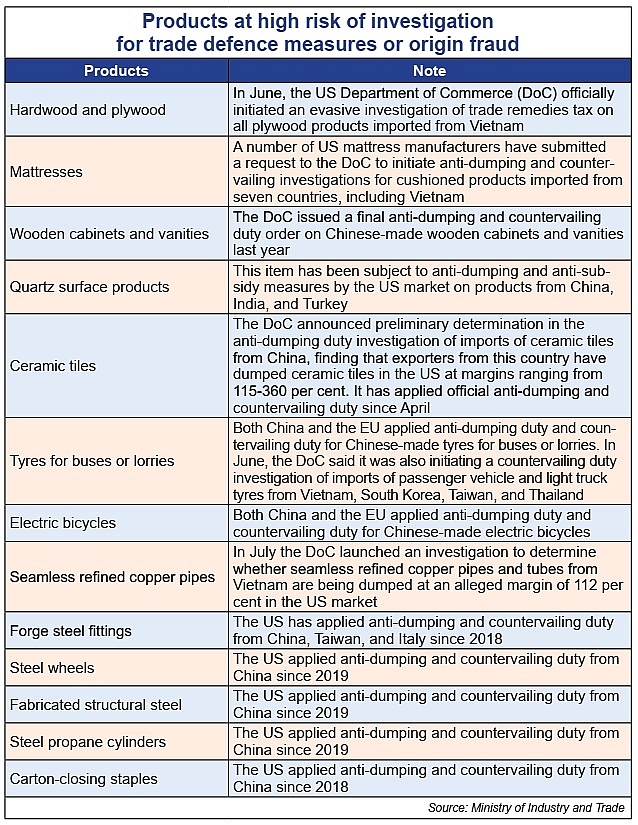Anti-dumping lawsuits looming over exporters
 |
| Chu Thanh Trung, deputy director of the Trade Remedies Authority of Vietnam under the Ministry of Industry and Trade |
Anti-dumping investigations have increased over Vietnamese products in recent times. Why do you think this is?
Such investigations have indeed been more frequent recently, especially for metal products, and there are several reasons. Firstly, national production capacity is growing day-by-day and export markets are becoming more diverse, and have a rapid growth in turnover. Secondly, with economic integration, the tariff barriers on Vietnam’s export goods have been increasingly removed, which also puts pressure on overseas enterprises to compete with Vietnamese products. This forces them to turn to legitimate trade policy tools to protect their interests. Thirdly, anti-dumping measures are frequently used by countries in international trade, and metal products have the highest frequency of incurring such measures. As part of that, the steel sector has witnessed a rise in anti-dumping lawsuits with an average of one in cases relating to these items.
Businesses will face a number of limitations when being investigated because in many countries the law on remedies and anti-dumping measures have been applied for a long time. Others are beset by a lack of resources and language barriers, as well as lack of time to provide sufficient information for any investigation.
In the context of this trend and the ongoing pandemic, what should corporate leaders be concerned with to protect their businesses?
Before the COVID-19 outbreak, global trade witnessed significant structural changes as some governments imposed more restrictive measures due to trade tensions and slowing growth. For now, due to the global economic situation and the unpredictable developments of a health crisis that has not been controlled completely, trade protection might continue to increase.
Businesses should carefully prepare for each plan, even gloomy prospects, and gain knowledge on trade remedies and laws, especially for the main export markets of the businesses. Building export strategies in order to avoid relying on one market, improving quality, and preparing all resources for anti-dumping in case of an investigation are all main tasks businesses should take into consideration.
In the case of encountering anti-dumping investigation requests from investigating agencies, businesses should actively participate in the process to ensure the provision of legal evidence benefiting the business, and thereby partly avoiding heavy fines from local authorities.
 |
What solutions has your authority taken to protect businesses and avoid anti-dumping suits?
Our authority maintains communication channels with many countries’ trade defence investigation agencies, associations, and the business community to promote and update cases, and build an early warning system for many industries and products that are at high risk of being tangled up in such issues.
In addition, in the spirit of protecting the legitimate rights and interests of producers and exporters, the authority always closely monitors and supports them to express their views against unsubstantiated arguments, violating World Trade Organization rules of the petitioner or foreign investigation agencies, and providing all documents for investigation.
Being aware of the complexities of the global trading environment in the new situation, the authority has identified three key tasks. First is to support and accompany producers and exporters to respond to foreign defence investigations, which focus on markets such as the United States, the European Union, India, Canada, Australia, Turkey, and in Southeast Asia.
Next, we will focus resources on investigative activities and apply measures to protect the interests of the domestic manufacturing industry on the basis of the proposal of the local damaged producers due to the sharp increase in the volume of imports.
What the stars mean:
★ Poor ★ ★ Promising ★★★ Good ★★★★ Very good ★★★★★ Exceptional
 Tag:
Tag:
Related Contents
Latest News
More News
- VinaCapital launches Vietnam's first two strategic-beta ETFs (February 26, 2026 | 09:00)
- PM sets five key tasks to accelerate sci-tech development (February 26, 2026 | 08:00)
- PM outlines new tasks for healthcare sector (February 25, 2026 | 16:00)
- Citi report finds global trade transformed by tariffs and AI (February 25, 2026 | 10:49)
- Vietnam sets ambitious dairy growth targets (February 24, 2026 | 18:00)
- Vietnam, New Zealand seek level-up in ties (February 19, 2026 | 18:06)
- Untapped potential in relations with Indonesia (February 19, 2026 | 17:56)
- German strengths match Vietnamese aspirations (February 19, 2026 | 17:40)
- Vietnam’s pivotal year for advancing sustainability (February 19, 2026 | 08:44)
- Strengthening the core role of industry and trade (February 19, 2026 | 08:35)




















 Mobile Version
Mobile Version